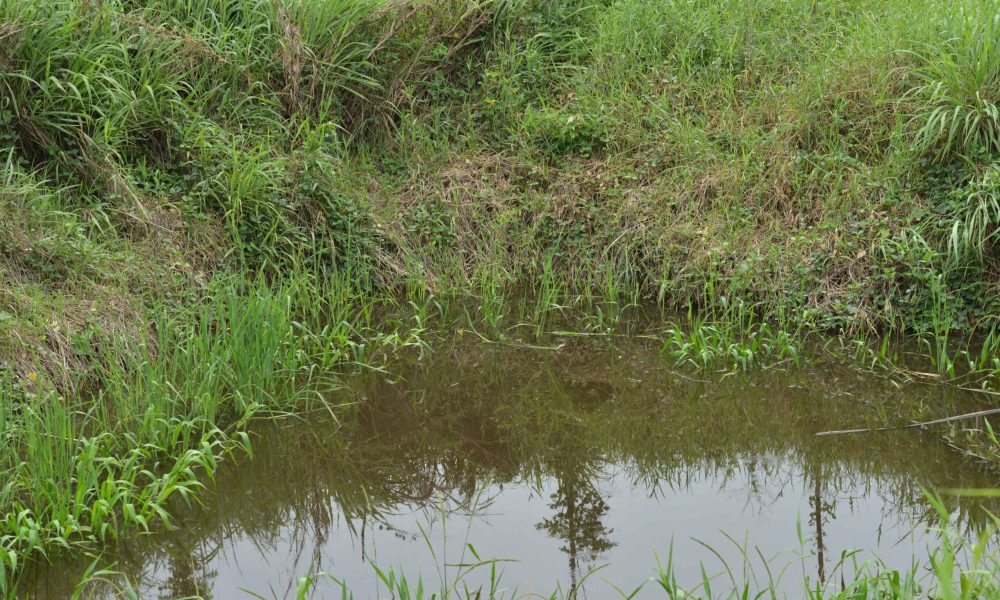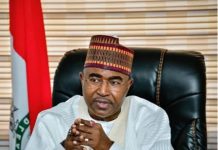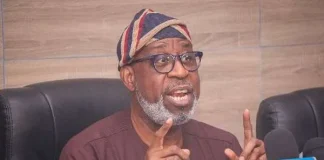🌿 Ruzu Non-Alcoholic Herbal Bitters
Ruzu Non-Alcoholic Herbal Bitters is a natural health supplement specially formulated to:
- ✅ Promote general wellness
- ✅ Detoxify the body
- ✅ Support the treatment of various ailments
Made from a powerful blend of 100% organic and medicinal herbs, Ruzu is completely alcohol-free, making it ideal for:
- 👪 All age groups
- 🌱 Health-conscious individuals
- 🌿 Anyone seeking non-alcoholic herbal remedies
Whether you're looking to boost your vitality, cleanse your system, or support healing the natural way, Ruzu Bitters offers a trusted herbal solution.
This investigation by PATRICK EGWU is the second of a year-long three-part investigative series on climate change disinformation and claims by international multinational oil companies – Shell and Eni operating in Nigeria’s Niger Delta region. Read part 1 here.
In February 2022, an oil pipeline owned and operated by Italian giant Eni ruptured and caused a spill in six oil-rich coastal communities in southern Ijaw, one of the largest oil-producing areas in the Niger Delta region. The spill flowed into the local river and farmlands, affecting aquatic life and contaminating the only water source for the communities.
Eni denied the spill ever happened. But after a joint investigation visit (JIV) the company blamed the spill on equipment failure, the oil major through its Nigerian subsidiary, the Nigerian AgipOil Company offered the clan head of the six communities N44 million ($27,000) as compensation.
Lasukugbene, one of the communities with about 1200 people, was offered N3 million naira ($1800). The community’s chief council chairman Zion Kiente said they rejected the offer.
Map of Niger Delta here
“We refused to be part of it,” said 54-year-old Kiente who was part of the joint investigation visit. “We asked those who collected the money to take it back to them. We have decided they must do the right thing of cleaning up oil contaminated areas and paying compensation for the damages caused.”
The JIV is part of an investigation process to determine the cause of oil spills. It is made up of representatives from the oil company, the host community where the spill happened and spill-regulation agencies such as the National Oil Spill Detection and Response Agency, a government agency which monitors and responds to oil spills in Nigeria.
Eni, just like Shell, has often denied the environmental impacts of their operations. Disinformation on the company’s websites, company records, yearly reports and documents, as well as videos and social about oil spills, remediation and climate change commitments have been used as a tool to advance their interests and discredit communities negatively affected by oil pollution.
The Bayelsa State Oil and Environmental Commission (BSOEC), a state-backed report which published its findings last year, indicted multinationals like Shell, TotalEnergies and ExxonMobil for oil spills amounting to 110,000 barrels of oil over the last 50 years. Forensic analysis of soil and water samples in the community over a two-year period, revealed an alarming level of toxic chemicals. Results from the blood and tissue samples from 1600 people across Bayelsa found elevated levels of heavy metals including lead, nickel and cadmium.
Earlier this year, Kiente’s community Nigeria-based legal representative G. C. Igbokwe (SAN) & Co., filed a lawsuit against Eni at the federal high court which has jurisdiction to hear the suit. In court filings obtained by Naomisophyblog, the community is demanding a proper cleanup of oil polluted sites and a N105 billion ($64 million) compensation for damages.
The document dated May 2023, said the oil company has refused to continue negotiations with “our community and pay fair and adequate compensation for the continuous losses suffered by our communities” despite demands by the community and their attorney.
In an email response, a spokesperson for Eni said the reported oil spill pertinent to its operations in Nigeria has been already cleaned up in 2022. Naomisophyblog confronted the company in an email with the ongoing court case, but the spokesperson never responded.
“There has been no compensation, no cleanup, or relief materials to my people,” Kiente insists. “That they have done the remediation work is absolutely false.”
A new court date has been set for November.
Eni blames spills on communities
Eni blames oil-producing communities for being responsible for spills – same old tactics of shifting blame that have been deployed by multinationals in the region for decades to evade responsibilities.
Eni told Naomisophyblog that 90 percent of oil spills in the Niger Delta were caused by third party interference such as theft, vandalism or sabotage. The company didn’t explain how it arrived at the data.
Infographics on hush payment made by Eni to communities affected by spills
Environmental activists in the region like Kiente have denied those claims. They have also blamed oil companies for stoking hatred and setting them up to fight each other in order to advance their corporate interests.
“It’s been their claims and narrative since the 1950s,” said Nnimmo Bassey, director of the Health of Mother Earth Foundation (HOMEF), an ecological think tank advocating for socio-ecological justice in Nigeria. “This is not the first time that they are claiming third party interference in their facilities. They are not just willing to accept their responsibility.”
Bassey said oil companies like Eni and Shell have invested a lot of resources to market that narrative.
“Only people with the technical skills and expertise from the industry can interfere with oil facilities,” he said. “In this case, the oil companies are the ones responsible for the interference and not the people.”
Kiente regularly monitors and tracks the activities of multinational oil companies in his community in terms of spills and remediation of contaminated sites. He said when the oil spill of 2022 happened, he formed a group from the community to conduct a post spill impact assessment which involves taking some notes, photos and videos for record purposes.
Crude oil was discovered in Oloibiri in 1956. Multinational oil companies have been operating in Nigeria ever since. Photo by Babawale Obayanju .
He told Naomisophyblog that while there are a few cases of vandalism, the pipelines which caused the 2022 oil spills in his community were worn out and have not been changed since they were laid in 1974 by the company.
“Every pipe has a lifespan and they (oil companies) have not been replacing them when they are due for replacement,” he said. “So, I cannot agree that those spills were caused by theft and vandalism because the evidence is there.
“The government has all the powers to keep these people in check and if you have left them to do whatever they want to do in your country, then they will get away with it,” Kiente said.
The company claimed it has constantly managed oil spills during the period of operation in Nigeria’s Niger Delta region “in terms of inspection, repair, clean-up of the spill area and remediation activities” and noted that it is “committed to disclosure and transparency on the topic of oil spills.”
The company added that some of its approaches to managing spills include surveillance and improved detection and monitoring systems for leaks on pipelines.
Kiente said if Eni will continue operating in their community, “their pipes should be changed so that the frequent oil spills won’t continue in that land. That is a hard demand.”
Poor remediation work
Benjamin Warder, 34, lives in Ikarama community with his wife and ten-year-old girl. Located some 60 kilometres away from the state’s capital, the fishing and farming community of more than 1,000 people is one of the oil spill hot spots in the Niger Delta region.
Shell and Eni have been operating in the community since the 1960s and have a history of oil spills, Warder says. He said an oil spill by Shell in 2022 affected a swathe of land, about 200 meters near his community and was not properly remediated.
Some months after the spills, Warder said he invested about N5 million ($3000) to build two fish ponds – an artificial or natural water feature designed to support aquatic life like fish. Fish produced from the ponds are normally consumed or sold to traders at the local market.
Benjamin Warder, 34, abandoned his fish pond due to crude oil in the ground after investing $3000. Photo by Patrick Egwu.
When excavators hired by Warder started digging a three-foot square hole to house the fish, crude oil deposits from the 2022 spill were found on the ground.
“It ruined everything for me,” Warder said, looking downcast as he stands in front of the ponds which have now been abandoned. “I tried to start but they (fish) died and didn’t survive because of the oil in the ground.”
Kiente and Warder said remediation work for oil-polluted areas have not been done according to best practices of testing contaminated soil and treating it and removing the oil contaminants.
“They just go there (oil polluted sites) with some shovels, turn the soil upside down, take photos and leave,” Kiente said.
“Most times in the areas where they claim remediation has been done, we go back and discover crude still beneath the ground. That is the major concern of our community because if they have done the work, why is there still oil on the ground?”Warder asked.
Morris Alagoa, an environmental and community activist who has been advocating a proper clean-up of oil polluted sites for more than 30 years, said the remediation work has been like “using some plastic to scoop whatever they can, and then leave the environment.”
“Those who have been working on the clean-up sites are locals who are not qualified to do the job,” he said. “We want experts to be part of those sample collections, and to ensure that they do the proper environmental audits and remediation of all legacy spill sites.”
A spokesperson for Shell told Naomisophyblog the company operates to the “same technical standards as other Shell companies globally” and in line with guidelines from the National Oil Spill Detection and Response Agency (NOSDRA), which “issues certificates of completion for every cleaned-up site upon satisfactory performance.”
A photo of Benjamin Warder’s former fish pond which still has crude oil deposits. Photo by Patrick Egwu.
Warder said the community has hired a lawyer and is readying to file a lawsuit against Shell and its subsidiaries operating in the region. He says the lawyer has written to the UK-based company and is awaiting their response.
Warder said he now runs a local restaurant business in the community to sustain his family after the 2022 spill affected his livelihood.
But his case is not isolated. Dozens of residents in the community who are either farmers or fishermen have had their livelihoods affected by the spill.
Gbaka Souiye, a fisherman in the community, told Naomisophyblog that oil deposits in the fish makes it difficult for him to sell at the local market.
“I invested a lot of money in the fish pond business but everything was a waste,” Warder says. “We have always been victimised by these oil companies.”
This investigative project was funded and supported by Bertha Foundation as part of the 2024 Bertha Challenge Investigative Journalism Fellowship.
The post INVESTIGATION: After an oil spill, Eni claimed it never happened (Part II) appeared first on Latest Nigeria News | Top Stories from Naomisophyblog.
















